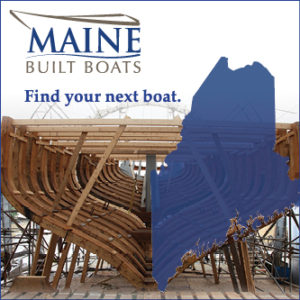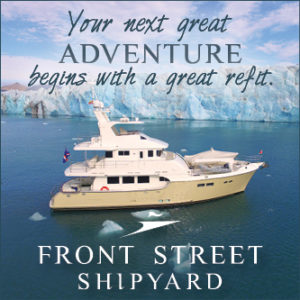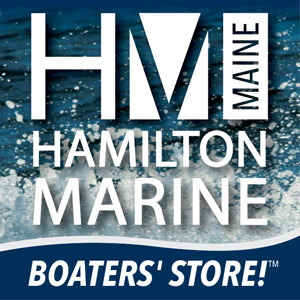By Sheila Dassatt
So many things have changed, yet some things haven’t changed at all. The love of the ocean and mystery of the sea stays the same, no matter how old you are. The old saying, “the ocean is so big and my boat is so small” is another scenario that does not change.
A large gang of traps was considered around one hundred to one hundred and fifty which were also constructed of wood and hand knit heads. The fisherman knit the heads himself with his wife helping him if she knew how to knit. He also spent a fair amount of time constructing the traps himself, even bending the bows for the traditional half-round traps. The buoys were all hand constructed out of wood and then painted with their trademark colors with basic oil based paint.
I can remember the smell of tar pots, linseed oil, pine tar, turpentine, and seeing big chunks of bees wax, all with preparing the ropes and buoys in mind. It was quite a process and not usually done single handed. The average fisherman had family that were able to give a helping hand, as well as the sternman (if he had one).
The “sounder” was a long length of line with a lead sinker on the end. The GPS was a compass and the knowledge of solar navigation. Yes, you really needed to know navigation and understand how to read the signs of the clouds and weather, plus the direction of the wind. This was very crucial to know because back then, we did not have a television with the Weather Channel on it. My first recollection was to listen to the NOAA Marine forecast on the VHF radio. I can hear it now, repeating itself in my mind’s memory bank. We also had to keep track of our trap strings manually, with a piece of paper and a pencil. Oh, by the way, there were no lobster bands, either. They were pegs of wood that the fisherman had to make himself. How tedious that must have been!
Even the boots from back then were typically hip boots that were folded down with neat handles on them halfway down, once they were properly folded for everyday walking. They still make them, but they are not commonly worn by the lobstermen now, mostly the worm diggers and clammers wear them now. My brother, Glenn’s first pair were bought at Friedman’s Store in Stonington, where all of the “little guys” got their first pair of fishing boots. It was quite a tradition! Nothing in that store changed much, it had an inventory that pretty much had what you needed when you had to have it. I loved going in there just to find things like aprons and hair nets when we picked crab meat.
They also used them at the local sardine plant because they also picked crab meat there.
Now we have spongex buoys and ready made float and sinking rope. We can still build our traps, but most likely they come from a trap builder due to the fact that a large gang now is at least eight hundred. They have pretty much gone to shrimp mesh heads due to the large production and time they save from having them hand knit. As time goes on, less and less people know how to knit trap heads. We try to keep with tradition and Mike knits his own trap heads as much as possible.
We now have GPS, radar, sounders that show the ocean bottom, fiberglass boats that are getting larger every day and buoys that are plastic that you don’t have to paint, just put tape around it of your choice of color! Some even have stereo radios that are signed into Sirius radio or satellite connection for our tunes. Imagine!
Nevertheless, whether we were part of the old school or enjoying the advances of today’s technology, we all have one thing in common, and that is SAFETY. We are facing new rules that are forcing us to trawl up more traps that are really uncomfortable for the rail of a smaller boat, which forces one to go with a larger boat to accommodate the change in rules. To go offshore now, a smaller boat is virtually taking risks just considering the amount of weight on the side board when the trawl is coming in over the side. We have already had reports of fishermen losing fingers, throwing their shoulders out and virtually getting caught in the trawl when it is re-set. Those trawls are a lot of weight, so you don’t want to go down with one by error.
Safety means more than one thing, meaning not just considering the changes in the Whale Rules, but also honoring the placards that are posted on the boat by Federal Law, not just the laws of the State of Maine. We do not want to be putting our loved ones in the hands of an impaired operator or crew member. Even though the State of Maine has changed a few laws concerning medical cards, it doesn’t change the Federal law. All Federally documented vessels must adhere to the stricter law which in this case is the Federal law stating “no illegal drugs.” I have been told that if a person has any form of marijuana on them when on board, the U.S.C.G. can confiscate your vessel. Now I may be right or I may be wrong, but I will stand corrected if it is not so. Personally, I do not want to take that chance with our fishing vessel or with members of the crew that are working on her. Safety means that we want to be well focused and aware of our surroundings at all times. These accidents can happen so fast, that you don’t even know what happened until it is too late. It’s not like we can hit automatic rewind and start that moment over again…..it is a moment in time. Every member of the crew should know how to run the boat if need be and be able to take it out of gear or put her in reverse if a crew member should fall overboard. I personally have had this experience with a happier ending because I knew what to do. We have also taken a safety course that is required for the apprentices. Everyone should take the course, regardless of your status on the boat. It is so valuable to know. Mike and I took our course with John McMillan with McMillan’s Survival Training. If you take the course, you will not regret it for sure.
So, from one generation to another, we want to continue our legacy and tradition. We are facing a lot of “red tape” this year that is aimed at the fishermen. We will survive this storm, I’m sure, but let’s do what is best for all of us and look out for one another. We are also the “Endangered Species” and frankly, I don’t want to give in to bureaucracy. I want to be able to pass our knowledge on to our children and grandchildren for generations to come.



